Ardyth DeBruyn's Blog, page 12
October 25, 2011
Ten Reasons to Try Nanowrimo
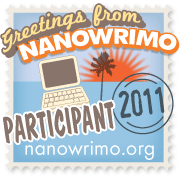 Every year about this time, there starts circulating a few mean-spirited blog posts about Nanowrimo (National Novel Writing Month) and why it's stupid or ineffective or objectionable. Setting aside that an attitude that looks down on new writers for "not being very good" and discouraging them from writing is mean-spirited, arrogant and even more counterproductive, what are some actual reasons to try 30 days and nights of literary abandon? Can you actually get anything good or worthwhile from working so quickly?
Every year about this time, there starts circulating a few mean-spirited blog posts about Nanowrimo (National Novel Writing Month) and why it's stupid or ineffective or objectionable. Setting aside that an attitude that looks down on new writers for "not being very good" and discouraging them from writing is mean-spirited, arrogant and even more counterproductive, what are some actual reasons to try 30 days and nights of literary abandon? Can you actually get anything good or worthwhile from working so quickly?
As a participant since 2004, here's ten reasons I think Nanowrimo is worth a try. It's not for everyone, but can be quite rewarding. And whether you "win" or not, the experience is enlightening.
1) Motivation – if you've always wanted to write a novel, but never had something to force you to sit down and just do it, Nanowrimo is the perfect motivation to get a move on it. It's a tight deadline that gets you working and working fast.
2) Out-writing the inner editor – in a lot of my early writing, I'd give up early, because I'd realize the story/writing sucked. The thing is, the only way to get better at writing is to write, revise, and then write some more. If you don't keep writing in the first place, that never happens. True, without some revision, you don't improve, but without getting stuff drafted in the first place, you don't have anything to revise. Sometimes after writing crap and outrunning the editor, you get brilliant bits of writing later in the book that are quite useful when revising.
3) Imaginative Experience – I believe writing a novel expands our brains and that's useful even if you're not intending to become a professional author. We experience characters coming to life, who then chat in our head, argue about the plot, and start feeling a bit like real and independent people. It's a magical and exciting creative experience I think it's good for people to experience. The power of creation, and watching your own fictional world come to life is something that builds us up as creative people.
4) Collective energy – there's a wonderful support in Nanworimo. All that collective energy of so many people working together at once is inspiring. It gets me moving in a way writing on my own often doesn't. With so many people to cheer you on, you're never alone.
5) Experimentation – I've found Nanowrimo is a perfect time to learn something new, try something that isn't part of the normal flow of my writing. Try a new genre, or a tricky plot, a strange point of view, something challenging. The rushed speed forces me to try wresting with it and making it work and either it does or it doesn't. Usually by the end of the month I know if the idea was worth it or if I'm trashing it.
6) Connections – I've met a lot of fantastic people during Nanowrimo, both online and in my community. The real-life based "write-in" groups make it possible to connect with a ton of local and inspiring people. Online, you can meet even more people on the forums. I've joined 2 critique groups I found during nanowrimo, and made lots of new friends and connections. It's a fantastic networking experience.
7) Keeps a sense of humor – when you're working this fast, you can't take your work entirely seriously, and you shouldn't. Keeping a sense of humor means you'll weather the challenges of writing better. When you get writer's block, being able to suddenly switch genres, use a challenge from the challenge thread, or start giving your characters all 2 or 3 word long names to up the word count helps keep writing fun and playful. So does breaking the fourth wall and ranting at your characters and letting them rant at you. Who cares if none of this stuff makes it into the final draft, if you do revise the book, it was fun, and writing ought to be fun.
8 ) Community Education – by participating in Nanowrimo, you help drive educational and literacy programs for children, as well as give your community an opportunity to think about authors, books, and writing. I've written in public places as part of the event, talking to and educating people on writing. I've even been interviewed for local papers. I'd love to also work with schools who do Nanowrimo in class someday.
9) Being an inspiration – creative energy has a way of encouraging other people to be creative too. By telling all your friends and relatives what you're doing, you're challenging them to consider their own creative projects, and watching you succeed will inspire them to try as well. At least that's what I've found, my family's creativity feeds off itself. My father's composing inspires me to write, my writing inspires my brother to draw, and his drawing inspires my mother to get moving on her educational craft projects, and so on. Inspire people to do something creative by doing it yourself.
10) You can't lose – no matter how many words you write, you've written more than you had before the month started. Even if they're terrible, they've gotten you writing, given you ideas, expanded your mind, and inspired you to perhaps start a brand new project in December. Seriously, no matter how little you get done, you're a winner and the supportive community surrounding Nanowrimo helps remind you of that.
Some of these were the reasons I chose to try Nanowrimo; some of them I learned along the way. My own personal journey and how Nanwrimo changed my life, was published here on the Nanowrimo blog in 2008.
October 18, 2011
A Villainous Halloween
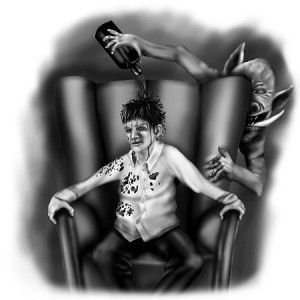 I've set the date for "A School for Villains" to be released on the auspicious day of Halloween. It seems the perfect date for a villainous debut.
I've set the date for "A School for Villains" to be released on the auspicious day of Halloween. It seems the perfect date for a villainous debut.
To celebrate I'm going to take a look at what makes a good (or is that bad) villain. While not every story features a villain, many good stories have one. A villain keeps the story moving, throws all sorts of challenges at the heroes, and sometimes, completely steals the show.
It seems to me there's several sorts of villains. Some of them are despicable, others pitiable, and some even sympathetic. Some are nearly all powerful, others weak and paltry. Yet they all have one thing in common, they're out to stop the main characters from getting what they want.
Here's some my favorites in a few of my mental categories:
Distant All-evil and Powerful Villains
These guys are big, bad, and often ugly. They lurk like an evil force throughout the book spurring everyone on to save the world from their evil plans. Usually these guys are set on world/universe domination, but sometimes they're just making everyone miserable for the fun of it. You don't know why they're evil, they just ARE. And they're out to get you.
Some of my favorites include Sauron (Lord of the Rings), Emperor Palpatine (Star Wars), Arawn Death Lord (Prydian Cronicles), Maleficent (Disney Sleeping Beauty), Shan Yu (Disney Mulan) and the White Witch (Naria).
Beleaguered Villains with Entitlement Issues
These guys are trying hard to belong to the first category. They desperately want to be all evil and all powerful, but whether they're beset by incompetent minions, stumble into some bad plans, or just have bad luck, things keep not going their way, no matter how evil they are. They continually have to prove they deserve their villainous title, all the while smacking the idiots they've surrounded themselves by. Yet, even if they are really at heart, evil, you can't help but sort of like them and admire their determination to get what they feel like they deserve. My favorites in this category include: Cluny the Scourage (Redwall), Jafar (Disney Aladin), Scar (Disney The Lion King), and Darth Vader (Star Wars).
Mistaken Villains
These guys are are convinced they're doing the Right Thing. The trouble is, they're wrong. Sometimes they figure that out, sometimes they don't. These villains end up in a gray area, because sometimes evil isn't straightforward. Are they justified or not? They make the argument they're just doing their job, or working for something that's also good. Some prime examples include: Prince Ramses (Dreamworks Prince of Egypt), Attolia (The Thief, The Queen of Attolia), Ratcliffe (Disney Pocahontas) and Mother Gothel (Disney Tangled).
Miserable Villains
These guys are pitiful in their misery, but they can't let go of what they think they want and be happy. They're struggling, and you normally would feel sorry for them, except they then turn around and do nasty stuff to other people you like more. They just can't let go of what's ruining their lives, often their pride. Some of my favorites here include: Gollum (Lord of the Rings), Prince Zuko (Avatar: The Last Airbender), and Captain Hook (Peter Pan).
Oh, and just for fun, here's the Disney Villain Kombat.
Who's your favorite villain?
October 10, 2011
The 1002nd Arabian Night (and better weather)
The winters rains have settled down in Oregon. The best thing to do in the cold and gray is to curl up with a book, and what would be better than a book about a warm place, like Arabia and Persia. I've become more interested in this area of the world since visiting it, the land of the 1001 Arabian Nights.
Djins, magic carpets, mythical beasts from Arabia and Persia, it's a great fantasy setting that's a distinct flavor. I've read a number of real life ethnographies that dispel the traditional fantasy tales into the complexity of real life, which is great, I enjoy learning about the cultures both good and bad, but I've always got a soft spot for an excellent fantasy adventure.
Fortunately, I'm not the only person who grew up loving those myths. There's some great middle grade and young adult fiction that takes Arabian Nights and goes a bit farther with it. Here's the ones that first come to mind.
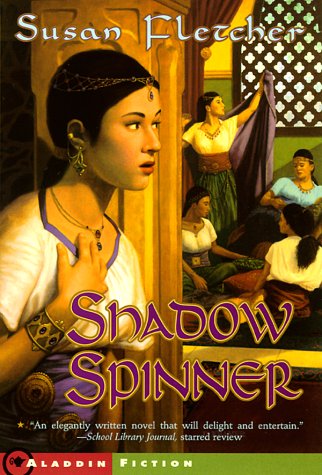 First, there's people who follow Shahrazad herself in a retelling of the famous frame tale. I've always liked follow Oregonian Susan Fletcher's "Shadow Spinner", which follows a young girl named Marjan who aspires to be like the famous Shahrazad, a story teller herself, and ends up in a position to help aide her hero. Full of side-stories, like the original myth, the characters are compelling and sympathetic.
First, there's people who follow Shahrazad herself in a retelling of the famous frame tale. I've always liked follow Oregonian Susan Fletcher's "Shadow Spinner", which follows a young girl named Marjan who aspires to be like the famous Shahrazad, a story teller herself, and ends up in a position to help aide her hero. Full of side-stories, like the original myth, the characters are compelling and sympathetic.
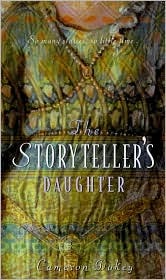 A slightly older version, aimed more at YA, is Cameron Dokey's "The Storyteller's Daughter". Shahrazad is blind and actually "reads" the stories off of long pieces of woven cloth using a magical ability in an interesting twist of the tale, and her stories told in the novel are new ones, made to match the reworking of the legend. The magic is inventive, although I don't believe it's as well written as "Shadow Spinner", I ended up keeping my copy and rereading it.
A slightly older version, aimed more at YA, is Cameron Dokey's "The Storyteller's Daughter". Shahrazad is blind and actually "reads" the stories off of long pieces of woven cloth using a magical ability in an interesting twist of the tale, and her stories told in the novel are new ones, made to match the reworking of the legend. The magic is inventive, although I don't believe it's as well written as "Shadow Spinner", I ended up keeping my copy and rereading it.
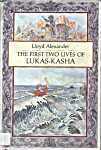 Next are a couple of authors who instead of focusing on Shahrazad, just use her devise, the frame tale. Using the mythos they branch off. I recently read "The First Two Lives of Lukas-Kasha" by Lloyd Alexander. The shiftless Lukas spends his one coin on a storyteller and gets more than he bargained for, ending up the main character of the story itself in a strange foreign (and rather Persian-like) land. Filled with Alexander's usual characters, they're all vibrant and engaging with some surprising depth reminiscent of his award winning fantasy based on the Welsh myths.
Next are a couple of authors who instead of focusing on Shahrazad, just use her devise, the frame tale. Using the mythos they branch off. I recently read "The First Two Lives of Lukas-Kasha" by Lloyd Alexander. The shiftless Lukas spends his one coin on a storyteller and gets more than he bargained for, ending up the main character of the story itself in a strange foreign (and rather Persian-like) land. Filled with Alexander's usual characters, they're all vibrant and engaging with some surprising depth reminiscent of his award winning fantasy based on the Welsh myths.
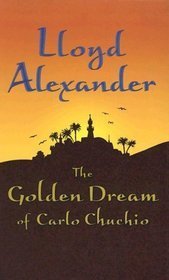
Noticing he'd also written yet another Arabian type novel, I then tried Alexander's "The Golden Dream of Carlo Chuchio." Again, it had all the usual suspects as far as characters you might expect, but in a slightly different combination, and was a fully enjoyable ride. The plot had a few more serious edges to it, but was still well within a middle grade novel despite that, but I'd recommend the older end of that, 11 or 12 and up depending on the child.
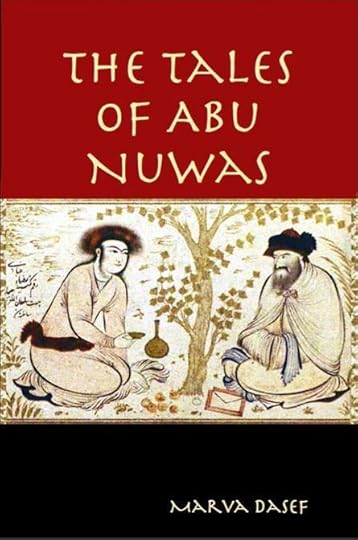 By chance, a week after reading this, I read another frame tale version by Marva Dasef (another fellow Oregonian). In "The Tales of Abi-Nuwas" we take the same format with a much kinder story teller who befriends a poor girl named . He tells her the story of Setara, an Aladyn-like tale with a Jinni who answers wishes literally rather than by intent, forcing Setara to constantly pin him down to get what she wants. Also lively and with sparkling characters it uses the Arabian night heritage to good use with cameos by some of mythological figures weaved in.
By chance, a week after reading this, I read another frame tale version by Marva Dasef (another fellow Oregonian). In "The Tales of Abi-Nuwas" we take the same format with a much kinder story teller who befriends a poor girl named . He tells her the story of Setara, an Aladyn-like tale with a Jinni who answers wishes literally rather than by intent, forcing Setara to constantly pin him down to get what she wants. Also lively and with sparkling characters it uses the Arabian night heritage to good use with cameos by some of mythological figures weaved in.
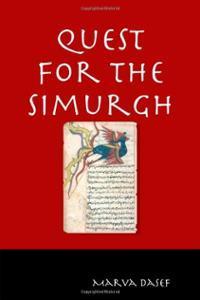 Marva has a second book set in the world as well, "Quest for the Smurgh" which is also enjoyable, but felt a bit like a Lloyd Alexander book in that I recognized all the characters as familiar faces in a slightly different setting. Still, it's a fun and cozy adventure in a warm place that fills out her fantasy world a bit more.
Marva has a second book set in the world as well, "Quest for the Smurgh" which is also enjoyable, but felt a bit like a Lloyd Alexander book in that I recognized all the characters as familiar faces in a slightly different setting. Still, it's a fun and cozy adventure in a warm place that fills out her fantasy world a bit more.
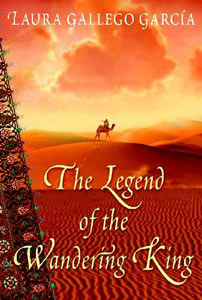 Then of course, there's simply telling a new tale in the familiar setting. My aunt gifted me last Christmas with "The Legend of the Wandering King" by Laura Gallego, which reads like it could be on of those tales in 1001 Arabian Nights itself. We watch the main character embark on both an inner and outer journey as he lives out a rather epic story. It's a bit distant in the narrative tone, but the colorful world it paints makes up for that and the older style of narration makes it seem even more like a fairy tale.
Then of course, there's simply telling a new tale in the familiar setting. My aunt gifted me last Christmas with "The Legend of the Wandering King" by Laura Gallego, which reads like it could be on of those tales in 1001 Arabian Nights itself. We watch the main character embark on both an inner and outer journey as he lives out a rather epic story. It's a bit distant in the narrative tone, but the colorful world it paints makes up for that and the older style of narration makes it seem even more like a fairy tale.
And hopefully it'll work out for me to take a real life break between all this reading this winter to actually go visit my friend Dubai again.
October 3, 2011
"A School for Villains" From Concept to Publication
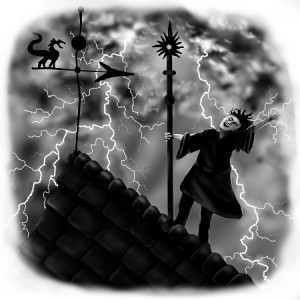 Every book has a unique journey and I thought in the final stages of production, I'd share the one for "A School for Villains."
Every book has a unique journey and I thought in the final stages of production, I'd share the one for "A School for Villains."
I have a long history of writing satirical pieces for friends and family. In college, I won an English award for the satirical epic poem "The Chronicle of Sir Morseau de Fromage" written in fakely translated verse, complete with an un-scholarly introduction. I've written several goofy and satirical short stories, several of which have been published in online magazines, and often my "serious" fiction also tended to have some satirical elements, such as the colored wizard names in "Chosen Sister" and the long troll names in the still under revision "Dragon Boy." However, I had yet to write a full length satirical work, until the idea of a magic school for villains that taught kids how to become Dark Lords came to me while joking around about Harry Potter.
I'm an avid Harry Potter fan. The books already have some great humor in them, and a wonderful tone that's a pleasure to read. So, I had no intention of attacking or tearing them down, but rather wanted to use their conventions as a launching off pad for my own creative satire, poking fun at the whole "bad guy-good guy" dynamic in so many fantasy worlds. I had already committed to writing "Chosen Sister" as a gift for my sister that year for Nanowrimo (2006) and decided at the same time to attempt to write "A School for Villains" as a fun joke gift for my brother.
I got horribly stuck. Full length satire turned out a lot more difficult than I expected. I got about 2/3 of the way through the book by the end of the month. To motivate myself to keep playing with the idea and finish it, I made a plan. Some people find working just for fun motivating, but I tend to want to write for an audience, so I planned to finish the book the next year, run it through my critique group, then submit it to agents as practice for facing rejection for my more serious work. After 30 rejections (and hopefully with a new and serious project ready) I would self-publish it on the web with print copies offered for sale. If I sold 10,000 copies I would write a sequel.
Following through on the plan turned out a lot harder and more involved than I could have imagined, not to mention some major changes in me, the book, and the industry in these past five years.
First and foremost, I fell in love with my book as serious project at some point within the revision and critiquing process. I found the characters were not just satirical, but also real people. The plot wasn't just mockery, but a true coming of age story, with room for a lot more in it. The novel offered a humorous but very real world, rather similar to Patricia Wrede's satirical "Enchanted Forest Chronicles" in tone. A world that was self-aware of fairy tale conventions and thus bent on making people conform to them and their often ridiculous perspectives.
And then, when I started sending the book out, I got such positive reactions,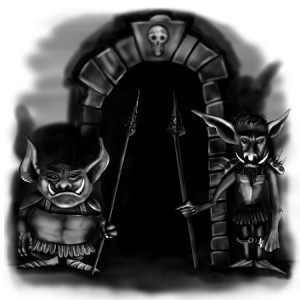 despite the rejections. Several times thanks to helpful comments from agents I reworked and deepened the book. I really fell in love with the idea of seeing it out there entertaining people as well as actually saying something worth saying. Taking my book seriously, however, had downsides. I got wrapped up in the rejections. They hurt and discouraged me. They made me question myself and ask hard questions, despite their mostly positive tone.
despite the rejections. Several times thanks to helpful comments from agents I reworked and deepened the book. I really fell in love with the idea of seeing it out there entertaining people as well as actually saying something worth saying. Taking my book seriously, however, had downsides. I got wrapped up in the rejections. They hurt and discouraged me. They made me question myself and ask hard questions, despite their mostly positive tone.
Twenty five rejections in, I started noticing some trends. Agents kept citing the economy being tight and the fact satire is a niche market. They were concerned there weren't many appropriate editors looking to acquire a book like this one, or if there were, they weren't editors they knew or had connections to.
At this point, so much has also changed in the industry. E-books have taken off and opened up niche markets. I found on Amazon at least two other authors who had published Harry Potter satires and both looked like they were selling well. After some hard thinking about my book, I decided to return to my original plan and go ahead and self-publish the novel. After all, when I'd started out, this work was just for fun, something I wanted to share with fellow Harry Potter fans for a laugh. And I felt looking at the other satirical offerings that my novel could offer something new and deeper to that audience.
Having had a deal with an online press with "Chosen Sister," I also had considerable more experience than my early plans. I now knew what having an editor could do for my work and how many times a novel has to get proofed in order to actually get all the typos out of it. I knew that I had to have a commitment to a high quality product if I was going to do this and sign my name to it. I considered finding a small press for the novel, but I wanted to follow my original plan and have more artistic control. I wanted my novel to be properly illustrated like most traditional middle grade novels.
So, I hired an artist and editor, researched indie publishing, and now am in the final stages of proofing the book. It's been an amazing and very educational journey and in the next couple of weeks I'll have a book I can be really proud of. I don't have a firm release date, since I'm still waiting on some of the art, but it's definitely worth the wait. I hope to have the book on sale sometime in the next couple weeks.
Through all of this, I've learned that sometimes humor can be serious business. I've learned to believe in myself and face rejection. I've learned that making a plan and following it is useful, inspiring, and can help give me perspective on myself and life. I still plan to pursue traditional publishing with my other work, both serious and humorous, but I'm also thrilled to be able to have the means to share a more niche work with readers.
And yes, if I sell 10,000 copies, in any format, I will write a sequel.
September 28, 2011
Her Hair was Often Snarly
Recently I changed my author photo because I had a hair epiphany. For the first thirty years of my life, my hair was a constant battle. Now, post-epiphany, my hair causes me no trouble at all in what feels a bizarre unreality. Who would have thought?
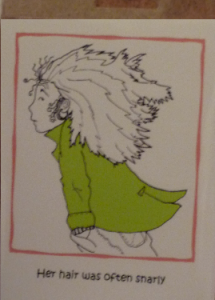 So the saga starts with the fact that I was born with a full head of gorgeous (or so everyone told me) blond curls. Perfect strangers loved to say to me as a child, "Oh, I wish I had your hair! You're so lucky!" Um, yeeeeah, if your hair involved being held down and having a brush ripped through it while you screamed, you would not consider yourself so lucky. Naturally, I resisted all brushing attempts.
So the saga starts with the fact that I was born with a full head of gorgeous (or so everyone told me) blond curls. Perfect strangers loved to say to me as a child, "Oh, I wish I had your hair! You're so lucky!" Um, yeeeeah, if your hair involved being held down and having a brush ripped through it while you screamed, you would not consider yourself so lucky. Naturally, I resisted all brushing attempts.
My hair made good dreadlocks, or large mats right behind my ears, like a Persian cat someone let outdoors. My mother tired to manage it by snipping it off periodically, but that's about as far as she got. As I got older, I made attempts, but after the 3 hour ordeal of untangling it, I usually was so tired of struggling with my hair, that I would not bother for a week and then have another ordeal. I kept planning to cut it, but that would involve going to a hair place, and I didn't want to when it was tangled and since it was almost never untangled… well, it was a self-sustaining cycle.
So I embraced the persona of this lovely little card by Terrea L. Bennett of Friday Harbor, WA. I sort of found a balance with my hair at medium length and wetting a brush to get it through my hair every morning and it was a decent compromise, but depending on the weather, my hair would snarl, sometimes more sometimes less, as the day went on.
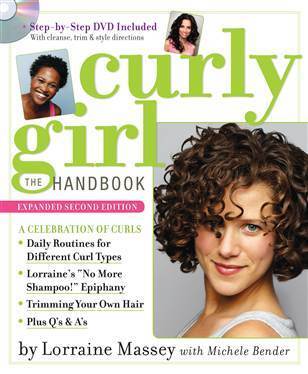 Then, one day my aunt, who'd always in my mind had wavy to straightish hair, showed up with her hair cut short and in curls. When I asked her about it, she talked about some book she got at the library and doing weird things that included no shampoo and not brushing it. Not brushing it, hah! I'd tried that… but not sans shampoo. So I went ahead and tried the book, figuring I didn't have much to lose.
Then, one day my aunt, who'd always in my mind had wavy to straightish hair, showed up with her hair cut short and in curls. When I asked her about it, she talked about some book she got at the library and doing weird things that included no shampoo and not brushing it. Not brushing it, hah! I'd tried that… but not sans shampoo. So I went ahead and tried the book, figuring I didn't have much to lose.
Surprisingly I learned a ton about my hair, which pretty much did what the book said it would when I followed the direction. Leaving me quite impressed with "The Curly Girl Handbook" by Lorraine Massey. It's never been easier to be curly-haired.
September 25, 2011
5 star review for Chosen Sister
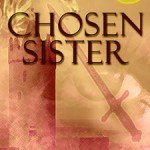 E-book It Reviews has given me a very uplifting 5 star review on "Chosen Sister." It feels wonderful to have someone really understand what I was going for with the novel and I'm really excited a kid got to enjoy it.
E-book It Reviews has given me a very uplifting 5 star review on "Chosen Sister." It feels wonderful to have someone really understand what I was going for with the novel and I'm really excited a kid got to enjoy it.
One thing that's been a bit frustrating with e-books is how few kids have readers yet, but I'm hoping that will keep shifting and more and more kids will be reading e-books.
September 19, 2011
Bad guys, Good guys, and the Ten-year Anniversary of Taggerung
The battle between good and evil is a well worn theme in fantasy books, shows, and movies. When I was young, I reflected this in my playing. My brother and I would divide the toys up into the good guys and the bad guys. Then the two would duke it out in a classic epic battle.
The toys that were good and the ones that were bad were usually set by the shows they came from, or we'd decide when we got the toy which side it "belonged" to. It was hard to give away the cool toys to the bad side, so their group usually got run by the purple panther Skelitor rides and a couple of battered insecticons. Some generic GI Joes would fill in the ranks as minions, or perhaps some plastic dinosaurs. It wasn't easy being evil, you only had the dregs to help you out, while the cool characters remained in the ranks of good.
The thing is, in this world of good vs evil, do the bad guys call themselves bad guys? Do they think they're bad? Revel in their evil and their plans for world domination, death, and destruction? Or do they think they're actually the good guys? Do they believe they honestly are on the side of right and that the good guys are the bad ones?
We used to break our brains a bit, considering that. Sometimes we played it one way, sometimes the other, but it was a debate that always caught my attention.
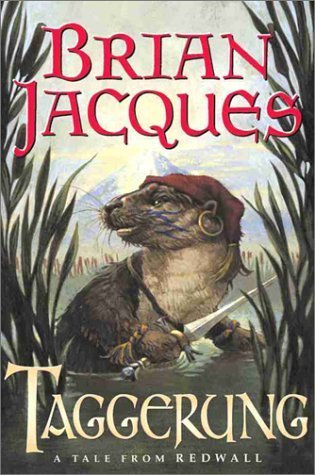 And then there was Taggerung, by Brian Jacques. Now don't get me wrong, while I'm going to complain about this book, I'm a huge fan of the Redwall series, and precisely because I'm a fan, is the reason this book bugs me. An avid reader of the series, while I started noticing the books were getting a little repetitive, I still faithfully bought each one as soon as it was released.
And then there was Taggerung, by Brian Jacques. Now don't get me wrong, while I'm going to complain about this book, I'm a huge fan of the Redwall series, and precisely because I'm a fan, is the reason this book bugs me. An avid reader of the series, while I started noticing the books were getting a little repetitive, I still faithfully bought each one as soon as it was released.
Most Redwall novels follow the same classic format our play world always did, with a team of good animals and a team of bad ones, usually defined by which animals
I was very excited when Taggerung was released. The book flap explained the story was about an otter (good guy animal) who as kidnapped as a baby and raised by ferrets (bad guy animals). Here perhaps was a good debate and adventure on the idea, with Taggerung questioning his upbringing. I excitedly dived in, only to be horribly disappointed.
Despite growing up in a family of selfish vermin who taught Taggerung constantly that selfishness and evil was the way to live, he seemed an instant hero. He was always fair, just, and righteous. He instinctively treated everyone he met kindly. He seemed too easily to realize everything his father taught him was wrong and too quickly walk away from his life of evil, and without a second thought. If he was raised entirely by vermin, where did he learn to be a good guy so easily? It left me with a picture of good guys always been inherently good and bad guys inherently bad, with upbringing mean basically nothing. He was an otter, not a ferret, so of course he was chivalrous and turned against the people who brought him up without a thought, all in the cause of good.
That didn't sit right with me. It seemed like a simplistic answer and a waste of what could have been a very interesting debate.
So, while I was frustrated with Taggerung, to the point I gave up reading any new Redwall books, I'm also thankful for it, because it started me exploring in my writing what makes the bad guys bad and the good guys good. As I gear up to release "A School for Villains" I don't feel like I've gotten to the half of it, but I have gotten some fascinating debates in my novels on this subject.
So, here's to celebrating a novel I hated and all the inspiration it's given me these past ten years.
September 12, 2011
Ten Unusual Adjectives
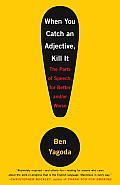 I've been brushing up on my particles of speech. As an author, keeping myself clear on the parts of a sentence and how they work together is critical to improving my writing. I've been enjoying "When You Catch an Adjective, Kill it: The Parts of Speech, for Better and/or Worse" by Ben Yagoda. It's a lot more fun than my college grammar book, that for sure.
I've been brushing up on my particles of speech. As an author, keeping myself clear on the parts of a sentence and how they work together is critical to improving my writing. I've been enjoying "When You Catch an Adjective, Kill it: The Parts of Speech, for Better and/or Worse" by Ben Yagoda. It's a lot more fun than my college grammar book, that for sure.
I think my attitude towards words has shifted as well. Once I used to look at them only in terms of homework, spelling, or what I can use to get the story down on the page smoothly. Now however, I enjoy learning new words. Yagoda collects unusual adjectives, and some of them are quite amusing.
Here's my ten favorite from his list. See how many of these you know. My spell checker didn't even know a few of them.
capacious
contumelious
fissiparous
fustian
nugatory
otiose
penumbrous
piacular
shambolic
tenebrous
Here's the definitions, along with a random attempt to put the word in a sentence. I feel like I have returned to grade school. I bet they sound just as stilted and homeworkeque as ever, but I keep telling myself it's good for me.
capacious – containing or capable of containing a great deal
In "Harry Potter and the Deathly Hallows," Hermione has a capacious handbag.
contumelious – insolently abusive and humiliating
The contumelious teacher upbraided the student for doodling in class despite it in no way interfering with his listening to the lecture.
fissiparous – tending to break up into parts
The setting sun cast a fissiparous reflection upon the flowing river.
fustian – high-flown or affected in style
Cinderella in her fustian gown and shoes was the star of the ball.
nugatory – of little or no consequence
Scandals in Congress are so common they feel nugatory these days.
otiose – useless; futile
The baby's otiose efforts to escape the playpen left him cranky.
penumbrous – shadowy or indistinct
The penumbrous towers rose about them in the twilight.
piacular – requiring expiation; wicked or blameworthy
The piacular student enjoyed sticking nails in his teacher's car tires.
shambolic – disorganized or confused
She searched desperately for socks through her shambolic pile of laundry.
tenebrous – dark or murky
He peered into the tenebrous depths of the basement.
September 8, 2011
A Commentary on Creativity
As I had to leave unexpected last weekend on a family matter, I didn't have time to write a proper post for this week. Now that I'm home, my brain is still a little scattered, so I'm going to share a short piece I wrote as a metaphor for creativity while at a live orchestra performance in the park.
***
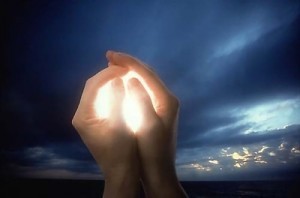
In the gathering gloom Elana waited, one hand clinging to Migov's arm. Pooli tagged along, busy peeling the bark off a twig. People kept arriving, striding into the green fields of the park. They laughed with their friends, bragging about how strong or how fancy a light they'd make. Some of them clapped others on the shoulders and challenged them, while others claimed tonight's prize for the best light would be theirs, that they would be the ones called up front in front of everyone.
Elana looked down at her pink hands, smeared with a bit of dirt from when Pooli shoved a rather muddy rock at her, insisting she look at it. A couple of fingers were sticky from dinner, a bit of fuzz clinging to the side of her right forefinger.
She tried to rub it off on the bottom of her shirt, but that only made it fuzzier. Pooli, as always, was oblivious.
"Are you sure we're supposed to be here?" Elana tugged on Migov's arm.
He chuckled. "Of course."
"But what if I can't make any light? Or what if my light is small and ugly."
"Everyone can make a light, sweetheart. It comes from inside of you. Maybe it'll be weak at first, but as you practice, it'll get stronger and prettier. If you feed it, it will pour of out you and light up everyone around you."
Elana sighed. Oh how she longed to do that, to stand at the front, light pouring out of her in bright rainbow colors, to have everyone gasp in awe at her, to wonder at what she could do with it.
The sky, as if beckoning them to try it, turned bright colors as the sun set. Golds, pinks, violets, the rest of it pale blue fading to royal blue, and then to black with stars as the sun sank down. All across the field people cupped their hands. Light sprang from them in small colorful flames, dancing across palms in twisting shapes.
Migov pressed his own together. "Like this," he whispered. Between them started to glow a soft golden light. As it expanded, tendrals like purple flames glittered and sparkled, swaying through it. Elana caught her breath, awed.
"Oh!" cried Pooli, dropping his stick.
"Now the two of you, try it." Migov smiled.
Pooli screwed up his face in concentration, slamming his hands together. For a moment nothing happened and then they began to glow, light in blues and greens dancing across his palms. "Oh! Oh!" Pooli turned in a circle, laughing. "Look, look, I can make pretties!"
The people around him chuckled, encouraging him, showing him their own lights. Migov laughed as well, calling out advice to him.
Elana tentatively put her hands together and pale light formed between, before disappearing. She took in a sharp breath and tried again. Slowly but surely the light formed, but no colors danced. It wasn't as big as Migov's, not even as big as Pooli's. Glancing around at the happy people around her, Elana couldnt' help but notice hers was smaller and plainer than anyone's.
"What's wrong?" Migov took his hands apart to place one gently on her shoulder.
She stared at her cupped hands in dismay. "It's… not very big." She peeked again at those around them. "It's so ordinary."
Migov frowned, considering her light. "So, what you're saying is, you don't think it's bigger or brighter or prettier than anyone else's?"
She bit her lip. "Everyone else's is better. I have nothing to add."
He shook his head. "Little one… oh, little one." He cupped his hands, the light dancing and swaying, pink and green in its depths, beautiful, unique. "When you put your hands together, when you call on the depths within yourself… you make light! Isn't it wonderful? Beautiful? Mysterious? Who cares how great, how different, how much it stands out. You've made it, from within you! And it comes out—becomes alive."
"But I want to stand out. I want it beautiful and wondrous like yours. I want everyone to see it, admire it, recognize it… only it's not very good."
"It's yours and it lives only because of you."
She shook her head.
He sighed. "Dearest, everyone longs to be recognized. But I'm going to tell you now… the recognition you need most is to recognize yourself. When you do this, when you can feel the pure joy of bringing this to life, when you can stand in the dark, bring light, and rejoice, then you will have everything you need, and with time the rest of it will come."
Elana dropped her hands as he turned away, talking with the others. Pooli ran in circles, making light. Everyone was so happy, so content. For a moment she felt bitterly left out. Then Migov's words, like the evening breeze, brushed against her again. Bitterness was not something that could be poured out, shared. It made no light.
Elana took a deep breath, the night air caressing her cheek, ruffling Pooli's hair, swirling around Migov. She was here, with them, in an evening park, full of light, full of people. A thousand set of hands burned, a thousand flames danced.
This power within me, it makes light, a beautiful light. And she soared above the crowd, free, soaking it in, so that in the future she could again pour it out.
August 29, 2011
Cover for "A School for Villains"
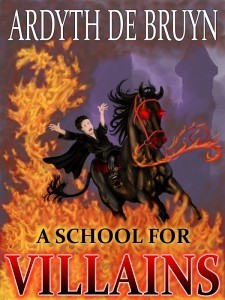 I just got my cover back from my artist (the very talented Leo DeBruyn) for "A School for Villains". The book is in production and will be released on October first. I'm really excited about this!
I just got my cover back from my artist (the very talented Leo DeBruyn) for "A School for Villains". The book is in production and will be released on October first. I'm really excited about this!
The cover captures the story perfectly, a strong satirical novel with plenty of humor and yet a villain (or is it hero?) you can root for. In tone, it's a bit like "Despicable Me" or "Megamind" with a Harry Potter type school setting.
Here's the blurb:
Thirteen-year-old Danny is astounded when his father decides to send him to Dark Lord Academy to learn to be a villain. Pa claims it will make him stand out and fulfill his own lost childhood dreams. Being evil doesn't appeal to Danny, but he's always been a good and obedient son, so he goes.
Dark Lord Academy's not just unappealing, it's downright terrible. His advisor dyes Danny's blond hair black and changes his name to the unpronounceable Zxygrth. He can't get the hang of maniacal laughter, his second-in-command servant is a puke-colored monkey, and the cafeteria lady enjoys serving stewed cockroaches or fried bat wings. A run in with a hero results in hate mail and he gets caught up in a rivalry with the school bully. The only way for Danny to stay alive is to find his inner villain.



